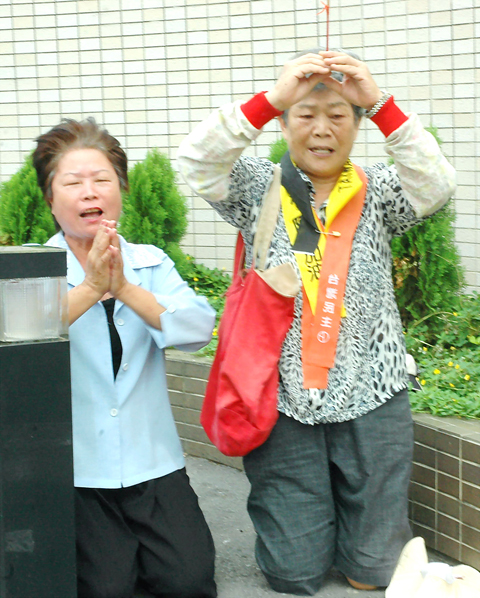District prosecutors said they would appeal the sentences given former president Chen Shui-bian’s (陳水扁) daughter-in-law, Huang Jui-ching (黃睿靚), and family friend Tsai Ming-che (蔡銘哲) because the fines were disproportionate to their involvement in Chen’s corruption cases.
Chen and his wife, Wu Shu-jen (吳淑珍), were found guilty of receiving kickbacks from a development company to pave the way for the construction of the Hsinchu Science Park by purchasing a plot of land in Taoyuan County from the company at a price prosecutors said was unreasonably high.
Former Hsinchu Science Park head James Lee (李界木) and Wu’s friend Tsai Ming-che were found guilty of pocketing part of the money and transferring kickbacks to accounts held by Chen family members.

PHOTO: CNA
Lee was sentenced to six years in prison and was deprived of his civil rights for three years. Tsai was sentenced to two years in prison, but could receive five years probation instead if he pays the treasury NT$3 million (US$92,000).
Huang was sentenced to one year and eight months and fined NT$150 million on money laundering charges. If she wants to receive probation in lieu of serving time, she must pay the treasury NT$200 million.
Prosecutors said they would appeal Huang and Tsai’s sentences because Huang would have to pay 67 times more than Tsai when it was clear that Tsai was heavily involved in the case while Huang was only partly involved. This was a violation of the principle of proportionality, prosecutors said.
Meanwhile, Chen’s office yesterday said the former president had asked his lawyers to file an appeal but that he would not attend the hearings if his appeals were not handled in a fair and transparent manner.
Chen’s office issued a statement citing an anonymous source at the High Court as saying that after Judge Chou Chan-chun (周占春) released Chen from detention last year, Taiwan High Court President Huang Shui-tong (黃水通) asked Judge Chen Hsiao-pei (陳筱佩) to determine whether Chou should be removed from the former president’s cases even though Chen Hsiao-pei was abroad at the time.
“In other words, it was a clear case of administrative interference in a trial for the High Court president to designate a certain judge to handle a particular case,” the statement said.
If the High Court engages in such “petty maneuvering” and abuse of authority again, the former president would again consider refusing to attend hearings or remain silent in protest, the statement said.
Chen Shui-bian remained silent at his pre-trial hearings, staring in June, to protest what he described as an unfair judicial system. He also relinquished his right to call witnesses or speak in his defense, saying they were unnecessary because he was innocent.
He broke his silence at the end of his trial in late July when he reiterated that the switching of judges last year was unconstitutional and that there had been no procedural justice in his trial.
Others have also claimed the switch was politically motivated. Some legal experts also said the decision to merge the trials had violated judicial procedures.
Chen Shui-bian’s office has asked the Council of Grand Justices to rule on the legitimacy of his pre-trial detention and the switching of judges from Chou to Tsai Shou-hsun (蔡守訓).
Taiwan High Court spokesperson Wen Yao-yuan (溫耀源) said yesterday that Chen Hsiao-pei had been selected from a random drawing, in accordance with the law.
As for which high court judge would preside over Chen Shui-bian’s appeal, Wen said the High Court would conduct a random drawing in accordance with the law and that the entire process would be transparent.

Taiwanese can file complaints with the Tourism Administration to report travel agencies if their activities caused termination of a person’s citizenship, Mainland Affairs Council Minister Chiu Chui-cheng (邱垂正) said yesterday, after a podcaster highlighted a case in which a person’s citizenship was canceled for receiving a single-use Chinese passport to enter Russia. The council is aware of incidents in which people who signed up through Chinese travel agencies for tours of Russia were told they could obtain Russian visas and fast-track border clearance, Chiu told reporters on the sidelines of an event in Taipei. However, the travel agencies actually applied

Japanese footwear brand Onitsuka Tiger today issued a public apology and said it has suspended an employee amid allegations that the staff member discriminated against a Vietnamese customer at its Taipei 101 store. Posting on the social media platform Threads yesterday, a user said that an employee at the store said that “those shoes are very expensive” when her friend, who is a migrant worker from Vietnam, asked for assistance. The employee then ignored her until she asked again, to which she replied: "We don't have a size 37." The post had amassed nearly 26,000 likes and 916 comments as of this

New measures aimed at making Taiwan more attractive to foreign professionals came into effect this month, the National Development Council said yesterday. Among the changes, international students at Taiwanese universities would be able to work in Taiwan without a work permit in the two years after they graduate, explainer materials provided by the council said. In addition, foreign nationals who graduated from one of the world’s top 200 universities within the past five years can also apply for a two-year open work permit. Previously, those graduates would have needed to apply for a work permit using point-based criteria or have a Taiwanese company

The Shilin District Prosecutors’ Office yesterday indicted two Taiwanese and issued a wanted notice for Pete Liu (劉作虎), founder of Shenzhen-based smartphone manufacturer OnePlus Technology Co (萬普拉斯科技), for allegedly contravening the Act Governing Relations Between the People of the Taiwan Area and the Mainland Area (臺灣地區與大陸地區人民關係條例) by poaching 70 engineers in Taiwan. Liu allegedly traveled to Taiwan at the end of 2014 and met with a Taiwanese man surnamed Lin (林) to discuss establishing a mobile software research and development (R&D) team in Taiwan, prosecutors said. Without approval from the government, Lin, following Liu’s instructions, recruited more than 70 software